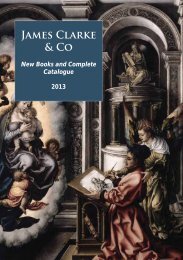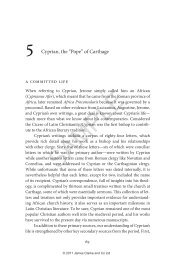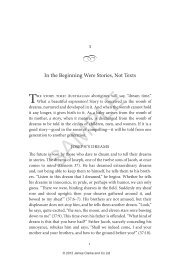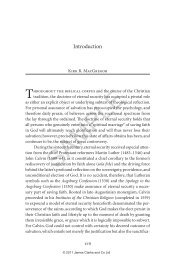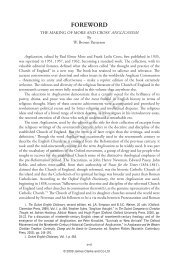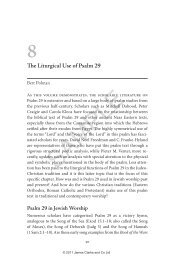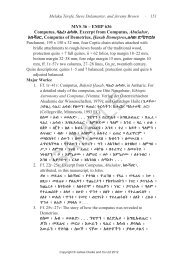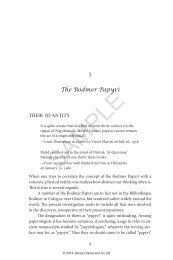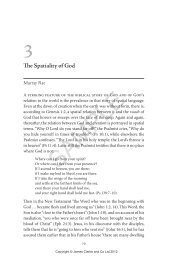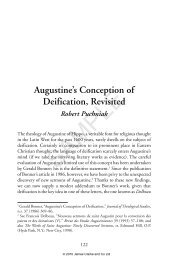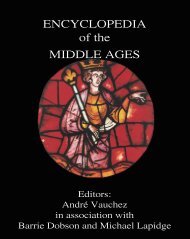Extract from Chapter 1 - James Clarke and Co Ltd
Extract from Chapter 1 - James Clarke and Co Ltd
Extract from Chapter 1 - James Clarke and Co Ltd
Create successful ePaper yourself
Turn your PDF publications into a flip-book with our unique Google optimized e-Paper software.
The Textual Words of the Analects <strong>and</strong> the Letter to the Galatians<br />
65<br />
describe.” It means that he passed on the knowledge of the classics but did<br />
not create new rituals <strong>and</strong> music, he trusted <strong>and</strong> loved antiquity. Analects<br />
7:1 means that knowledge has its foundation in past wisdom.<br />
The great Master, <strong>Co</strong>nfucius himself, was an exemplary learner.<br />
He was omnivorous <strong>and</strong> described himself as a person who was fond of<br />
learning. <strong>Co</strong>nfucius learned <strong>from</strong> the way of the sage-kings, King Wen<br />
<strong>and</strong> King Wu, but also <strong>from</strong> the common people. He was not ashamed to<br />
ask inferiors for information, 25 he never denied anyone who came to him<br />
for learning (Analects 7:7). 26 Learning, he believed, was not limited to<br />
the classroom or to formal education, learning can happen in any social<br />
setting. <strong>Co</strong>nfucius said that when there were three persons together, he<br />
could find a teacher among them, he could learn <strong>from</strong> the good points of<br />
others; the bad points he could also learn <strong>from</strong> them <strong>and</strong> he could correct<br />
the same weak points in himself (Analects 7:22). 27<br />
The Analects is full of discourses on learning. Studying involves not<br />
just thinking but, foremostly, observation <strong>and</strong> listening (Analects 2:18). 28<br />
Learning must be supplemented with critical reflection to be fruitful;<br />
critical reasoning must be supplemented with study to be coherent.<br />
Learning without reflection is futile; reflection without learning is perplexing<br />
(Analects 2:15). <strong>Co</strong>nfucius expected his students to take initiative<br />
in studying, to think hard, for “no vexation, no enlightenment; no<br />
anxiety, no illumination” (Analects 7:8). 29 He also expected his students<br />
to draw inferences <strong>and</strong> not just do rote memory (Analects 7:8).<br />
SAMPLE<br />
25. When asked why the minister of Wei Kong Wenzi was called “wen” (meaning<br />
“refined”) <strong>Co</strong>nfucius replied to his disciple Zigong that, because he was intelligent <strong>and</strong><br />
fond of studying, he was not ashamed to ask his inferiors <strong>and</strong> learn <strong>from</strong> them, <strong>and</strong> this<br />
was the meaning of wen (Analects 5:15). See Yang, Lunyu Yizhu, 104.<br />
26. In his studies, <strong>Co</strong>nfucius started <strong>from</strong> the basic <strong>and</strong> gradually worked his way to<br />
the upper levels. If he was understood by anyone, perhaps it was heaven, so he did not<br />
complain against heaven, he did not blame any person (14:35). See Qian, Lunyu Xinjie,<br />
234.<br />
27. See Chen, Lunyu Duxun Jiegu, 122.<br />
28. “When Zizhang asked how to seek an official’s salary, the Master said: ‘Hear<br />
much, leave out what is doubtful, discreetly speak about the rest, <strong>and</strong> you shall make<br />
few mistakes. See much, leave out what is hazardous, discreetly practice the rest, <strong>and</strong> you<br />
shall have fewer regrets. If you make fewer mistakes in speech <strong>and</strong> have fewer regrets in<br />
action, an official’s salary lies therein” (Huang, Analects, 55–56; Analects 2:18). See Yang,<br />
Lunyu Yizhu, 39.<br />
29. Huang, Analects, 88.<br />
© 2008 <strong>James</strong> <strong>Clarke</strong> <strong>and</strong> <strong>Co</strong> <strong>Ltd</strong>



